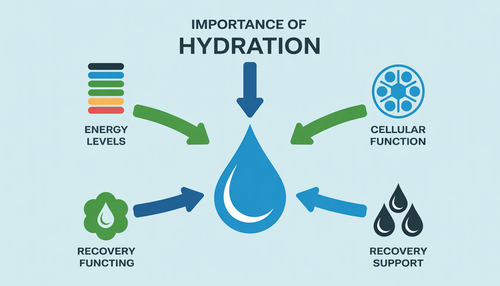Effective recovery after a workout is essential for maintaining your fitness and well-being. By recovering quickly, you can minimize muscle soreness and prepare your body for future challenges. Key components of a successful recovery include addressing muscle soreness and maintaining optimal hydration.
How to Recover Quickly After Workout
Recovering quickly involves a mix of hydration, nutrition, and rest strategies. Here are some practical tips to help you bounce back faster:
- Hydration: Staying hydrated is vital for recovery. Proper hydration aids muscle repair, reduces fatigue, and maintains performance. As noted in Sports and Hydration for Athletes, maintaining fluid balance is crucial for all fitness enthusiasts.
- Nutrition: A balanced meal or snack with protein and carbohydrates after a workout helps muscles recover and replenishes energy. For more on post-workout nutrition, see this guide on the best post-workout drink.
- Rest: Adequate sleep is necessary for muscle repair and strength. Aim for quality rest to support your recovery.
- Active Recovery: Low-intensity activities, like walking or cycling, enhance blood flow to muscles, aiding recovery without extra strain.
Incorporating these strategies into your routine can significantly enhance your recovery, helping you maintain your fitness goals and feel your best.
What Helps Sore Muscles After Workout
Muscle soreness post-workout is common, but several methods can ease discomfort and speed up recovery:
- Stretching: Gentle stretching improves flexibility and reduces tension. Include a few minutes of stretching after each session.
- Foam Rolling: A foam roller releases muscle tightness and boosts blood flow, aiding recovery. Roll over each muscle group for 30 seconds to a minute.
- Gentle Yoga: Light yoga promotes relaxation and circulation, enhancing recovery.
- Massage: Massage improves blood flow and reduces inflammation. Consider professional massages or using a home massage tool.
- Warm Baths: A warm bath soothes muscles and provides relaxation. Adding Epsom salts may enhance the benefits by reducing inflammation.
Importance of Hydration in After Workout Recovery
Hydration is critical for effective recovery. It supports muscle repair, reduces fatigue, and maintains performance levels. As highlighted in Sports and Hydration for Athletes, fluid balance is vital for all fitness enthusiasts.
Here’s why hydration is key:
- Replenishes Fluids: Exercise leads to fluid loss through sweat. Rehydrating replaces these fluids, keeping your body functioning properly.
- Supports Muscle Function: Water is essential for muscle contractions and joint lubrication, ensuring efficient muscle performance.
- Enhances Nutrient Delivery: Water transports nutrients to muscles, aiding in repair and growth.
- Reduces Muscle Cramps: Proper hydration prevents cramps and stiffness, common after intense workouts.
Incorporating hydration into your recovery routine is a simple yet effective way to ensure your body recovers quickly and efficiently after exercise.
How to Reduce Muscle Soreness After Working Out
Reducing muscle soreness is crucial for maintaining a consistent exercise routine. Here are effective strategies to ease discomfort:
- Cool-Down Routine: Spend a few minutes cooling down with light walking or stretching to help muscles transition from activity to rest.
- Nutritional Support: Eating the right foods supports recovery. Incorporate protein and carbohydrates to replenish energy and support muscle repair. For dietary tips, see what to eat after a workout.
- Hydration: Staying hydrated reduces soreness. Water transports nutrients to muscles and removes waste. Consider INHALE® Superoxygenated Water for enhanced hydration.
How to Recover Muscles Quickly
Speeding up muscle recovery allows you to resume workouts sooner with less discomfort. Here are actionable tips:
- Active Recovery: Engage in low-intensity exercises like walking or cycling to increase blood flow without extra strain.
- Rest and Sleep: Quality sleep is vital for muscle repair. Aim for 7-9 hours of sleep per night.
- Massage and Foam Rolling: These techniques alleviate muscle tension and improve circulation, speeding up recovery.
- Gentle Yoga: Incorporating gentle yoga enhances flexibility and reduces tightness, promoting faster recovery.
By integrating these practices into your routine, you can help your body heal naturally and return to workouts feeling refreshed and ready.
Best Recovery for Sore Muscles
Recovering from sore muscles is essential for maintaining an active lifestyle. Adequate sleep is a key factor in muscle recovery. Good sleep allows your body to repair and strengthen. According to ACE Fitness, sleep supports muscle recovery by:
- Promoting muscle repair and growth through the release of growth hormones.
- Reducing inflammation to ease soreness.
- Improving mental clarity and focus, enhancing workout performance.
To optimize sleep for recovery, aim for 7-9 hours of quality sleep per night. Create a restful environment by keeping your room dark, cool, and quiet, and maintain a consistent sleep schedule.
Conclusion
Effective recovery after a workout is crucial for maintaining fitness and well-being. By incorporating strategies like proper hydration, nutrition, rest, and active recovery, you can help your body heal naturally. Remember, staying hydrated is vital, and INHALE® Superoxygenated Water is designed to support optimal hydration levels. Consider trying their subscription service for convenient and ongoing hydration support.
By integrating these recovery tips into your routine, you can enhance performance, reduce soreness, and recover faster. Make these practices part of your lifestyle to enjoy the benefits of a well-recovered body.


